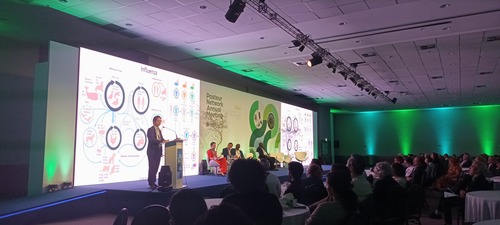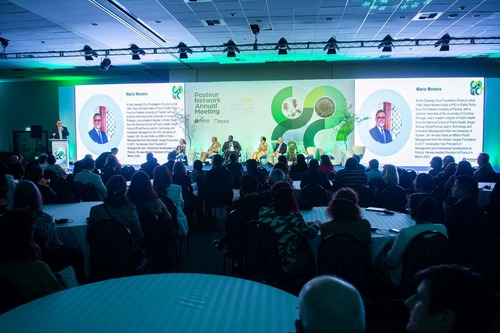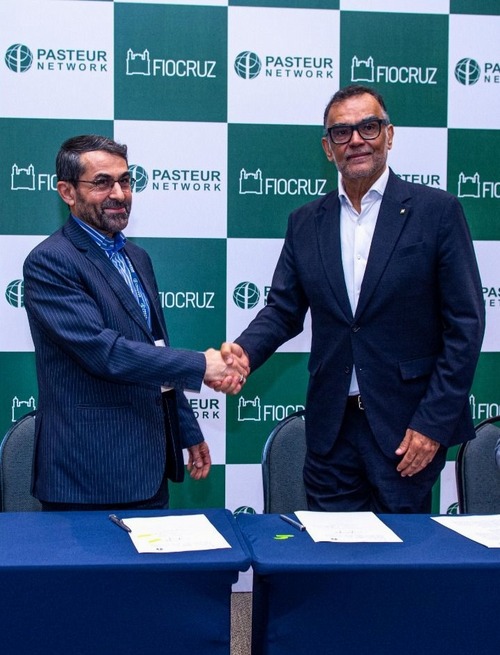The Pasteur Institute of Iran participated in PNAM in Rio de Janeiro
The Pasteur Network Annual Meeting (PNAM) in 2024 was jointly held with the Oswaldo Cruz Foundation (Fiocruz) from October 21 to 24 in Rio de Janeiro, Brazil. This event provided an opportunity for leaders and experts from more than 30 institutions across over 25 countries on five continents to discuss global health challenges, including epidemic preparedness, climate-sensitive diseases, and the role of artificial intelligence in health research. Dr. Rahim Sorouri, the head of the Pasteur Institute of Iran, and Dr. Fariborz Bahrami, the head of International Affairs participated in this meeting.
On the first day of PNAM, Dr. Sorouri held discussions to expand international collaborations with institutions from France, Vietnam, Tunisia, and South Korea in the fields of production and prevention of infectious diseases. Moreover, an Action Plan between the Pasteur Institute of Iran and the Pasteur Institute of St. Petersburg in Russia was signed by Dr. Sorouri and Dr. Areg Totolian. Based on a Memorandum of Understanding (MoU) signed between the General Directors of the two institutes on September 29, 2022, this Action Plan outlines a two-year collaborative initiative, aimed at enhancing scientific collaboration, educational exchange, and joint research in public health, diagnostic development, and molecular epidemiology.
On the second day of PNAM 2024, following earlier negotiations, an MoU was signed between the Pasteur Institute of Iran and the Fiocruz Foundation, which outlines the conditions for scientific, economic, and biotechnological collaboration between the two institutions for the next five years. This MoU was officially signed during a dedicated session attended by Dr. Rahim Sorouri and prominent officials from the Fiocruz Foundation, including Dr. Mario Moreira, the president of the foundation, Dr. Maria de Lourdes Aguiar Oliveira, Vice President of Research and Biological Collections and the Director of Bio-Manguinhos unit, Dr. Mauricio Zuma. The MoU addresses significant areas of research and production, including vaccines, diagnostic kits, development of research projects, exchange of researchers and health information, and hosting joint international conferences. Based on this MoU, Action plans tailored to the needs of the parties will be developed and implemented in the agreed-upon areas to leverage the experiences of both institutions in controlling infectious diseases and producing biological products using innovative technologies.
On PNAM’s third day, Dr. Sorouri participated in the General Assembly session of the Pasteur Network, which included the heads of affiliated institutes and the board of the network. The session reviewed financial reports and decisions from the past year and outlined the frameworks for future programs of the network. On the sidelines of the events during these 3 days, Dr. Sorouri held bilateral discussions with the President and the Executive Director of the Pasteur Network, as well as the the heads of the Pasteur Institutes from France, Vietnam, Tunisia, South Korea, Senegal, Laos, Guadeloupe, Uruguay, Hong Kong, and Ho Chi Minh City (Vietnam) in the fields of production and prevention of infectious diseases. The discussions focused on the key research and educational programs of the mentioned institutes and showcasing the capabilities of the Pasteur Institute of Iran for joint projects.
Moreover, Dr. Sorouri, , visited the campus of Fiocruz Foundation in Rio de Janeiro, which includes the historic Mourisco Castle as well as the Bio-Manguinhos unit, hosted by Dr. Zuma. Bio-Manguinhos is a designated unit for research, innovation, technology development, and the production of vaccines and diagnostic kits. This unit primarily addresses the needs of Brazil's national public health and is known for having one of the largest vaccine production centers in Latin America, ensuring self-sufficiency in essential vaccines required by the Brazilian Ministry of Health.
During this visit, Dr. Zuma provided a comprehensive overview of the history and current initiatives of the unit, highlighting its efforts in the design and production of mRNA vaccines. This presentation was followed by a guided tour of several key production areas within the facility. During the visit, Dr. Sorouri emphasized that due to the structural similarities between the two institutions, Fiocruz could serve as an exemplary model for elevating the standards and capabilities of the Pasteur Institute of Iran. Dr. Sorouri concluded by advocating for enhanced scientific collaboration between the two institutions to foster mutual growth and innovation.




